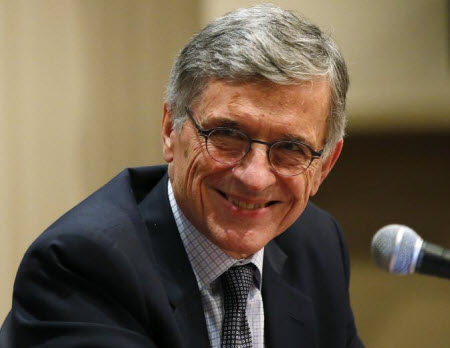FCC IG Finds Wheeler Authorized Lifeline Leak
The smarter way to stay on top of the multichannel video marketplace. Sign up below.
You are now subscribed
Your newsletter sign-up was successful

The Senate Commerce Committee has released the findings of an FCC Inspector General (IG) report into the leak of information surrounding a failed compromise on Lifeline reform between Republican commissioners Ajit Pai and Michael O'Rielly and Democrat Mignon Clyburn.
The report concludes that FCC chairman Tom Wheeler did authorize "the release of the fact that a compromise order with a cap on Lifeline [might] be on the agenda," but that that was within his right as the chairman to change the nature of the information from nonpublic to public.
The conduct was neither improper nor illegal, but unusual, the IG said.
The report also concluded that the chairman did not authorize the disclosure of the amount of the cap on the fund, and "found no evidence that the information was provided to the press in an attempt to unduly influence the outcome of the vote."
FCC Communications Director Shannon Gilson explained to the IG that "throughout the morning of March 31st, the FCC Office of Media Relations had been inundated with calls from the press and that it was clear many reporters and stakeholders were already aware a deal was being crafted by Commissioner Clyburn and the Republican commissioners. Thus, because she felt it would be beneficial to get the story out accurately, Gilson sought and received authorization from Wheeler and Milkman to provide the press with high level details."
"The IG report found that the Chairman properly used his authority to make public certain information about the changing state of play regarding the Lifeline Order," said FCC press secretary Kim Hart. "The report also found that he did so in response to intense media interest in the item and to ensure accurate information was being reported, not to improperly influence another Commissioner as has been alleged."
An FCC official speaking on background called it "curious" that Wheeler staffers had very clear recollections of what happened the morning of the meeting, while staff in "other offices" could not recall details about their conversations with reporters.
The smarter way to stay on top of the multichannel video marketplace. Sign up below.
Then there was the fact that while the IG found the chairman had not authorized the leak of the amount of the cap, it got out anyway.
“The findings by the inspector general reveal significant dysfunction and a lack of transparency at the FCC,” said Commerce Chairman Sen. John Thune. “Under the agency’s current interpretation, the FCC chairman is free to leak cherry-picked details about proceedings and deliberations while other commissioners are gagged and even kept in the dark about decisions by the chairman to approve such leaks. Worse yet, the FCC is not keeping a record of decisions by the chairman to disclose non-public information. This report is yet another indication of increased partisanship and dysfunction at the FCC that underscores the need for Congress to reform how the agency does business.”
Thune last April sought the investigation into how a compromise Lifeline proposal fell apart and what role the possible disclosure by the FCC of nonpublic information played in that process.
Wheeler had proposed a soft cap of $2.25 billion on the low-income Lifeline advanced telecommunications subsidy, which the FCC is migrating to broadband. That would have been an extra $750 million in spending and even that could be exceeded if necessary. Republicans were looking for a cap and the compromise was $2 billion and no going over that unless the FCC commissioners vote to raise it.
In a letter to Wheeler back in April, Thune said events surrounding the FCC's March 31 meeting, at which the Lifeline proposal was voted, raised "new questions about the Commission's policies for the disclosure of nonpublic information."
In launching the investigation, Thune said the delays were "highly unusual -- they certainly were for the generally punctual Wheeler commission -- and cited media reports, including Multichannel News/Broadcasting & Cable stories, about the compromise and the delay.
Thune said the leaks of info appeared "designed to engage outside interest groups to disrupt the deal struck between the Republican Commissioners and Commissioner Clyburn.
The March 31 meeting was delayed for over three hours after the Republican-backed compromise was struck and then fell apart after commissioner Clyburn decided she could not support a cap on the Lifeline fund, which subsidizes advanced telecom to low-income residents. The FCC is migrating the fund to broadband, but ultimately voted not to cap the fund, though approaching the $2.25 billion allocation would trigger a review of the fund.
How she came to that conclusion was what the Republicans wanted to know.
The Lifeline vote was 3-2, and particularly contentious, with the Republicans complaining about the collapse of the deal and laying blame at Wheeler's feet, suggesting he had tried to get stakeholders opposed to the cap to submarine the deal of which he was not a part. Wheeler has said there was no such strategy to kneecap the compromise, and the suggestion that there was "balderdash."
Contributing editor John Eggerton has been an editor and/or writer on media regulation, legislation and policy for over four decades, including covering the FCC, FTC, Congress, the major media trade associations, and the federal courts. In addition to Multichannel News and Broadcasting + Cable, his work has appeared in Radio World, TV Technology, TV Fax, This Week in Consumer Electronics, Variety and the Encyclopedia Britannica.

